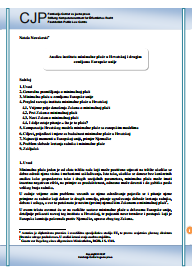Analiza instituta minimalne plaće u Hrvatskoj i drugim zemljama Europske unije
Analysis of the Institute of Minimum Wages in Croatia and other European Union countries
Author(s): Nataša Novaković
Subject(s): Law, Constitution, Jurisprudence, Public Law, Labor relations, Evaluation research, Law on Economics, EU-Legislation
Published by: Fondacija Centar za javno pravo
Keywords: Public law; legislation; wage; minimum wages; EU countries; Republic of Croatia; comparison;
Summary/Abstract: The paper aims to give review of mechanisms for setting up minimum wages in EU countries and to compare it with Croatian mechanism. The author tried to illustrate how minimum wage levels vary considerably across EU member states. In Croatia, we had three methods of setting up minimum wages in last five years so it is interesting to see what we have achieved (if) with this reforms. Statutory minimum wages imply both benefits and costs. They can play a role in preventing wages from falling beyond socially unacceptable levels. They can also serve to improve incentives to take up work. But if they give rise to large disemployment effects their costs may outweigh the benefits. Their effectiveness in bolstering incomes of low paid workers will also depend on their interactions with other policies designed to support law income households. It appears that government in Croatia has no clear position on the future of the minimum wage. The government initiates and facilitates negotiations between social partners and would most likely accept any agreement as long as it does not include direct costs for the government budget. The government may have some motivation to support a higher minimum wage for tax collection purposes. The practice of envelope payments is widespread and that means that many more workers falsely declare the minimum wage as their total income than they should. In such cases, an increase in the minimum wage would not affect employment but only increase tax revenues. However, any increase in the minimum wage level would also increase costs of unemployment benefits and as a result the government position is likely to be neutral on cost grounds. Last example – law on minimum wages in Germany showed that this will be pretty important subject in European Union, especially now when infringement procedure is activated.
Series: Fondacija Centar za javno pravo - Analize
- Page Count: 17
- Publication Year: 2015
- Language: Croatian
- Content File-PDF
- Introduction

